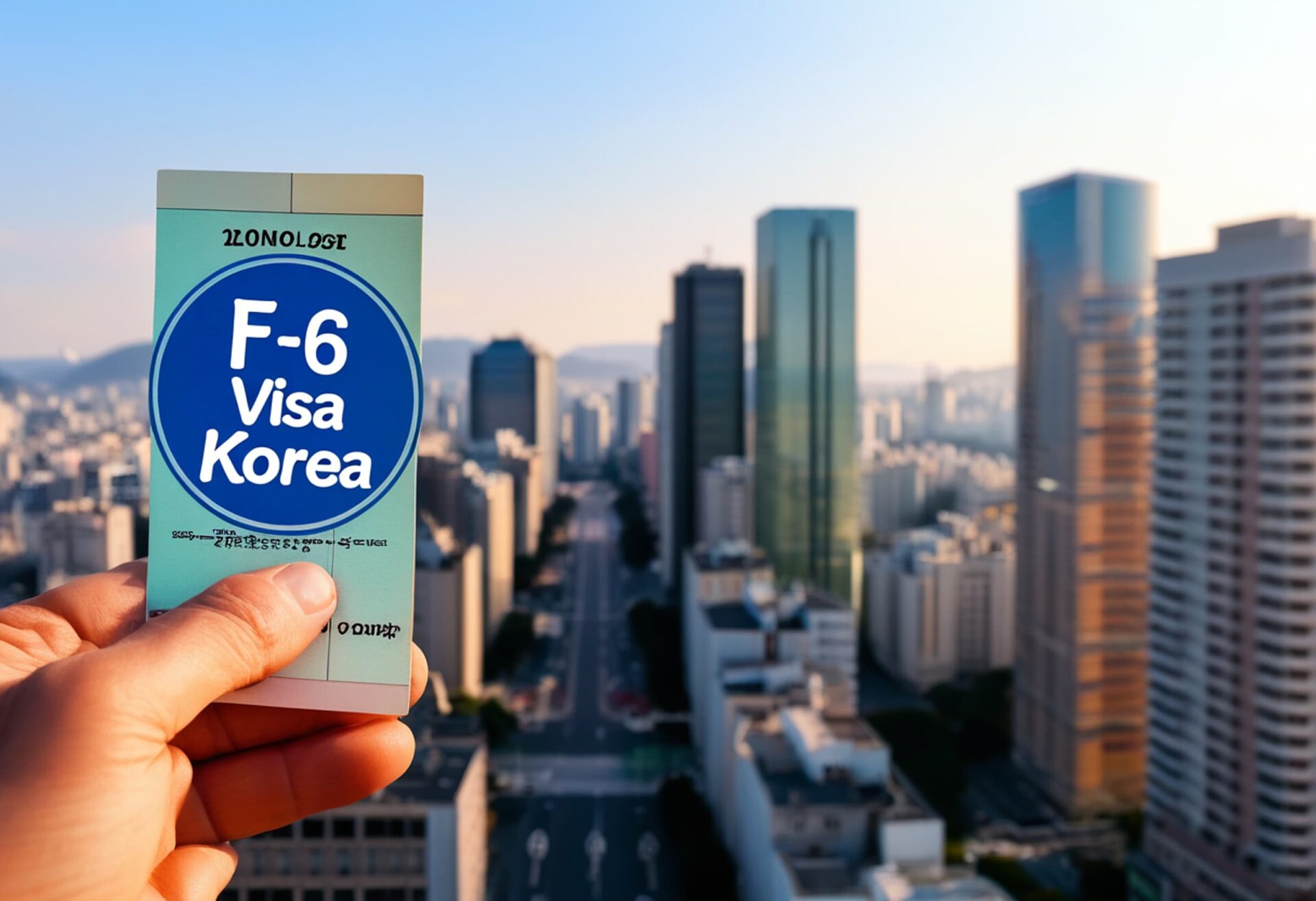F-6 Visa Korea Requirements
South Korea’s F-6 Visa lets a foreign spouse (or certain ex-spouses/parents) of a Korean national live and work in the Republic of Korea for an extended (and renewable) period. This article details visa sub-types, eligibility requirements, application documents, and the general visa application process. The legal experts at Pureum Law Office also offer some pro tips to make the application process smoother.
F-6 sub-types
- F-6-1 — Spouse of a Korean National
This sub-type is for couples with a legally registered marriage in Korea who intend to cohabit in Korea. This visa is also commonly known as the Korean Marriage Migrant Visa (F-6-1).
- F-6-2 — Raising a Child
This sub-type is for parents (father or mother) who are raising a minor child born within a marriage (including de-facto marriages) with a Korean national.
- F-6-3 — Marriage Discontinued at no Fault of Your Own
This sub-type is issued if you can’t maintain the marriage due to causes beyond your control (,e.g., death or disappearance of your spouse) and the reason is recognized by the Minister of Justice.
Can you work on an F-6?
Yes! F-6 holders may work in Korea (subject to general Korean licensing rules by profession). Multiple reputable guides—including public-sector guides—note that F-6 status allows employment without a separate E-series work visa. This gives F-6 visa holders the ability to work in Korea without many of the restrictions and requirements other visa holders face.
Core eligibility checks (how officers decide)
- Genuine relationship
Officers will review the history of relationship (often through invitation/guarantor letters, photos, interview etc) to assess if your relationship and marriage is genuine or for other purposes.
- Ability to communicate
Since 2014, consulates expect couples to share a basic communication language (Korean or a shared foreign language); some missions ask for TOPIK/Sejong or an interview.
- Financial & housing stability
Immigration offices often commonly require documents on the Korean spouse’s income/assets and housing (owned or leased by the spouse/family).
- Criminal background/health checks
Many consulates require a criminal background check — such as that provided by the American FBI — and a health certificate. These requirements will vary depending on the country or state of residence of the foreign spouse. For more information on the required documents, please check the checklist provided by your specific consulate or embassy.
Tip: Requirements differ by country/consulate. Always follow your local consulate’s checklist and use the Korea Visa Portal (for applications made outside the country) or Hi Korea (for applications made within the country) for status checks.
How to Apply for the F-6 Korean Visa
If you currently reside outside of South Korea
- Register your marriage in Korea, then gather the consulate’s F-6 checklist: application, passports, marital records, income/housing, language, criminal/health docs.
- Apply at the Korean embassy/consulate with jurisdiction over your residence (some allow visa-issuance approval via the Korea Visa Portal).
- Receive a 90-day entry visa (single- or multi-use). You must enter Korea within the timeline specified on your visa.
After you enter the Republic of Korea
- Register for a Foreign Residence Card within 90 days at your local immigration office using the HiKorea portal for reservations. This is required for all long-term stays. Be sure to book an appointment in a timely manner to avoid penalties that are incurred if you fail to register within 90 days of arriving in Korea.
- Extend your stay at the immigration office. Your initial F-6 sojourn is typically set after completing your registration. Immigration offices can grant 1 to 3 years depending on the applicant’s individual circumstances.
Required Documents for F-6 Visa
- Application form, passport, photo, verification of visa fee payment
- Korean marital records and resident registry of the Korean spouse
- Income & housing proof (tax certificates, employment letter, lease/ownership)
- Proof of ability to communicate (TOPIK/Sejong or shared-language interview)
- Criminal record & health check per mission instructions, which differ by consulate/embassy, follow your mission’s guidelines
If the marriage ends (divorce, death, separation, etc.)
- With a minor child:
Apply for the F-6-2 Visa (child rearing) if you have custody or recognized visitation/interaction with a child born to your Korean spouse.
- Without children, not determined to be your fault:
You may qualify for the F-6-3 when the marriage ends due to the Korean spouse’s death/disappearance or other reasons not attributable to you (subject to MOJ recognition)
- If you don’t qualify for F-6-2/3:
Temporary options to remain can exist (eg, short-term F-1 in limited property/household-arrangement cases). In such cases, we recommend that you speak to immigration or an immigration lawyer early to avoid deportation or illegal periods of sojourn in the country.
Pathways after F-6 Visa: Permanent Residency & Korean Citizenship
- Permanent Korean Residency (F-5)
The Ministry Of Justice’s guide notes that F-6 holders can apply for F-5-2 (spouse of national) after 2+ years’ of residence in addition to fulfilling certain language, financial and good-conduct criteria. KIIP Level 5 can satisfy the “basic knowledge” requirement of the visa, thus it is recommended that F-6 holders interested in attaining the F-5-2 participate in the KIIP program.
- Korean Naturalization
Under South Korea’s Nationality Act, marriage-based applicants can apply for Korean Nationality after 2 years of continuous residence in the country while married, or after 3 years of marriage with 1+ year’s residence. Exceptions cover spouse death/disappearance or other causes not attributable to the applicant. Completing KIIP can exempt the written test/interview component of the naturalization process.
F-6 visa FAQs
How long is the F-6 visa I get from the consulate or embassy?
It is usually a 90-day entry visa (single or multiple) when applied for outside of Korea. After registering as a foreign resident at the Korean immigration office, you may be granted a 1 to 3 year stay on the F-6 visa. You may then continue to extend your stay at the immigration office.
Do I need to be proficient in Korean to qualify?
You must share a language with your Korean spouse for daily life — either basic Korean (TOPIK/Sejong) or a shared foreign language verified via interview.
Can I work on an F-6 visa?
Yes, F-6 status permits employment (subject to licensing for specialized and regulated professions).
What if we have a child?
That can simplify some consular/embassy procedures, and if the marriage later ends, F-6-2 exists to ensure the child is raised in Korea.
Do I have to register after entering Korea?
Yes, apply for your Residence Card within 90 days of arrival using HiKorea.
Pro tips on the F-6 Visa
- Mirror your consulate/embassy’s checklist exactly. Document formats and translations vary by mission, don’t assume a generic list covers you.
- Book with Korean immigration early. Popular offices fill quickly and missing the 90-day registration window risks penalties.
- Plan language proof in advance. If you can’t show Korean ability, be ready for a shared-language interview or relevant documents.
- Keep evidence of cohabitation. Utility bills/leases, photos, and travel records often help during extensions or if your case later involves F-6-2/-3.
Final Thoughts on the F-6 Korean Visa
Navigating Korea’s visa and immigration system can feel overwhelming, but each visa route is designed to support foreign spouses during their time in Korea. If you are facing problems during your application process, or are confused regarding the required documents and proof for applying for the F-6 visa, we are here to help.
Pureum Law Office specializes in helping clients prepare not only for their F-6 visa application, but also on how to maintain a peaceful and lawful married life in South Korea. Let us help.
For personalized legal assistance, contact us any time.




